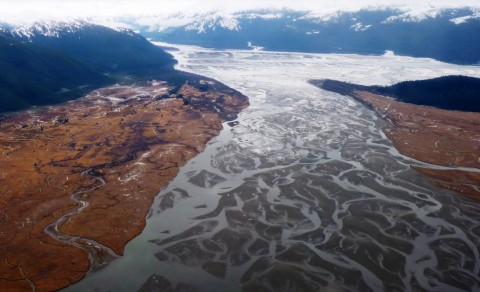
The Stikine River empties into the ocean near Wrangell. Mines and energy projects proposed for upstream sites in Canada are worrying some fishermen and tribal leaders. (Ed Schoenfeld/CoastAlaska News)
Southeast Alaska tribal leaders meet March 25th and 26th to discuss Canadian mines that could impact regional fisheries.
The Summit on Headwater Transboundary Development was called by the Organized Village of Kasaan, where Richard Peterson is tribal president.
“When you talk about the Stikine and the Unuk and some of these other rivers, and the impact on the Chinook and the ooligan (eulachon) and the other fish that go up these rivers, we want to make sure they have adequate plans in place that can promise minimal impact,” Peterson says.
The Stikine is east of Wrangell and Petersburg, while the Unuk is northeast of Ketchikan. The Taku, east of Juneau, is another transboundary river with a mine in its watershed.
Chris Zimmer of the group Rivers Without Borders Transboundary Watershed Alliance says the main focus is the KSM Project. It’s a proposed gold and copper mine across the border in British Columbia, roughly 80 miles east of Wrangell.
“Basically, you have what could be considered a time bomb up there of a massive acid-mine drainage factory that’s going to continue to leach acid-mine drainage pollution for hundreds of years. So the question is, can that be contained? Can these tailings dams last forever? Can we trust the mines to do the job right?” Zimmer asks.
Randy Wanamaker says we can.
“Modern mining is different from older mining, when people didn’t worry about the environmental consequences of things,” Wanamaker says.
Wanamaker is a former Juneau Assembly member who ran a business training tribal members for mining jobs. He’s also a director of Goldbelt, the capital city’s urban Native corporation, and he’s working with the Palmer mine prospect upriver from Haines.
“Canada has a good permitting process and environmental review process. It’s different from ours, but it’s no less stringent. They will take into consideration whatever it is we point out to them that would be an issue for us because the same fish that we’re protecting also migrate up into Canada,” he says.
Some tribal leaders are already working with developers of rare-earth, gold and silver mines on Prince of Wales Island.
Kasaan’s Peterson wants a similar relationship with Canadian companies.
“Whether we come out pro or con depends a lot on the engagement of the mines. We’ve had really successful open dialog with Heatherdale and Niblack and Ucore. They’ve been really great about being forthcoming and I actually really have a lot of praise for those groups,” Peterson says.
A representative of British Columbia’s KSM prospect will be at the Prince of Wales Island meeting, in Craig. So will representatives of B.C. tribal groups, called First Nations.
Transboundary mine critics are also traveling to Washington, D.C., around the same time to lobby for federal involvement.
A group from Southeast will call for the State Department to increase Alaska’s voice in mine permitting and development.
Rivers Without Borders’ Zimmer says it’s a significant issue for the state.
“The scope here is massive. It’s across the entire transboundary (area). So you have tribes, fishermen and businesses almost from Yakutat to Haines and all the way down past Ketchikan concerned here,” Zimmer says.
Groups involved include the Alaska Trollers Association, Trout Unlimited, the Petersburg Vessel Owners Association, the Southeast Alaska Conservation Council, the Tlingit Haida Central Council and several tourism businesses.





